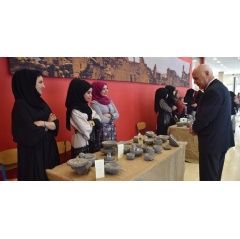Culture Provides Sustainable Livelihoods for Women in Northern Jordan
In one of Jordan’s poorest communities, women have been working hard to create livelihoods using newfound skillsets spanning from rock art to heritage tours, through a UNESCO capacity-building project.
In response to poverty and gender marginalization challenges in northern Jordan, what began as a project to sell souvenirs to tourists passing through, has blossomed into the provision of comprehensive hospitality and cultural education services. The women participants have discovered that culture can act as a source of resilience in a part of Jordan where women’s economic participation is extremely low and where tens of thousands of Syrian refugees have settled.
The project began in 2014 and initially attracted 12 participants who learned to use the black basalt stone native to the area to carve attractive rock art. As women began to see their friends and neighbors lifting themselves out of poverty by selling their artwork, more joined and today they number fifty. Participants in the project then developed a storefront to display their artwork for purchase, and they now attend bazaars and markets around Jordan to reach an ever-wider market. Artisans Umm Mahmoud and her teenage daughter Muna explained that prior to the project, they did not possess the skills to create and sell rock art. “I enjoy making the artwork, and the income it brings to my family is indispensable,” said Muna, who was 15 when she married and now has two children to support.
The ‘Ladies of Umm el-Jimal District Women’s Association’ soon expanded from rock carving and art sales to hospitality. The women recently established a restaurant above their storefront, just steps from the archaeological site of Umm el-Jimal. Inscribed on the Tentative List of UNESCO World Heritage sites, it represents a key tourist destination in northern Jordan, attracting approximately 3,000 visitors a year.
‘Umm el-Jimal Gourmet’ provides traditional Bedouin dishes to visitors. To develop menus with tourists in mind, the women attended cookery courses at the Royal Academy of Culinary Arts. Project participant Wafa explained “though we learned to cook from our grandmothers, this program helped us to explore new cooking methods.” Previously, visitors exploring this far-flung area had limited dining options. “Now that these services are being provided by the local community, tourists will feel encouraged to visit us again and again” added Wafa. The women have been clever in filling this niche while sharing their culture and traditional food; and their brand-new restaurant is enjoying considerable traffic.
Additionally, a number of members of the women’s association received training on the history and cultural significance of the archaeological site and its sustainable preservation. They developed the ‘Umm el-Jimal Education’ team and now transmit this knowledge to local children using interactive, stimulating thematic activities and tours. “I have learned that Umm el-Jimal is an ancient city that witnessed 5 civilizations; each has left its fingerprints on the city” said Eman Al-Quirian, a student in the course. Thus far, 750 children aged 8-13 have enjoyed the activities of the ‘Umm el-Jimal for Children’ component of the project.
Throughout the project, the women have participated in a range of training courses, and a key component is the focus on women’s rights and empowerment, an element crucial to the promotion of a gender-responsive business environment in Umm el-Jimal. Participant Ahlam Al-Masaeid explained that “through the sessions, we have been able to raise awareness in the local community about our right to work.” Along with learning about the marketing and quality control of their products, the life-skills classes have served to boost the women’s confidence.
The project was generously supported by Amman’s Embassy of the Kingdom of the Netherlands and UN Women. While great strides have been made during the past 3 years, the progress will only be cemented with further donor support as the women work to continue to develop their skills and potential. UNESCO is currently seeking new partners to extend the project. Muna, a young mother and project participant, said “We have strengthened our community and our families count on this income. It is essential that we keep up the training courses and build on what we have accomplished.”
( Press Release Image: https://photos.webwire.com/prmedia/6/211772/211772-1.jpg )
WebWireID211772
This news content was configured by WebWire editorial staff. Linking is permitted.
News Release Distribution and Press Release Distribution Services Provided by WebWire.
